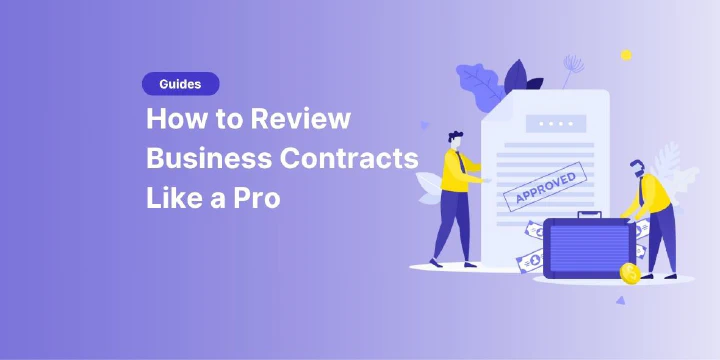Freedom of Contract: Comprehensive Guide - Meaning & Examples
Freedom of contract means parties can independently and fairly negotiate and set their own terms, conditions, and responsibilities without the government restictions. Although this freedom seems the opposite of government regulation, it still has limits: contracts must still follow the law and cannot be unfair or involve illegal activities. Dive into the world of freedom of contract to discover how to fully exercise your rights while making fair, balanced agreements. From personal stories to practical tips, we guide you through the principles of freedom of contract.

If you’ve ever wondered what exactly lies behind the term “freedom of contract” and why it could be important for you and your business, then you’re in the right place.
Freedom of Contract – What Is It Actually?
Freedom of contract means as long as the activities are legal, parties have the right to freely enter, negotiate, and terminate contracts. It is a fundamental principle in civil law that allows people and companies to regulate their relationships and transactions according to their own wishes and needs.
The idea of freedom of contract has roots in the laissez-faire economic philosophy, which promotes minimal government intervention in private affairs. By giving people and businesses the flexibility to shape agreements, it encourages innovation, competition, and economic efficiency.
Freedom of Contract in Simple Terms
Imagine walking into a store to buy a new smartphone. You have the freedom to choose from various models, brands, and contract terms. This freedom – the choice – is essentially what we understand under freedom of contract. It’s about having the right to make your own decisions when it comes to contracts, whether it’s signing a new phone contract, accepting a job, or renting an apartment.
Why is this important for you?
- Freedom of Choice: You can choose whom to do business with and under what conditions.
- Adaptation to Your Needs: You have the opportunity to shape contracts so they perfectly fit your needs.
- Protection of Your Rights: It’s also a protective mechanism ensuring no one can force you into a contract you don’t want.
But There Are Limits…
Just like everything in life, freedom of contract has its limits. You can’t simply shape any contract any way you like. There are legal regulations and social norms that must be observed – for the protection of all parties involved. For example, you can’t legally sign a contract that violates the law or harms someone else.
A Day-to-Day Example
Imagine a scenario where a person signs a work contract in haste and without thoroughly checking the details. Over time, they notice certain contractual clauses are not in their best interest. This experience becomes a valuable lesson: The freedom to enter into contracts also carries the responsibility to fully understand what you’re committing to.
In the following sections, we’ll deepen our understanding of the principles of freedom of contract and explore how to use them to your advantage.
The Principles of Freedom of Contract and Their Importance to You
Now that we know what freedom of contract is and why it’s important, let’s take a look at how it works in practice. The principles of freedom of contract are like the ingredients in your favorite dish – each is important to achieve the perfect outcome in the end.
Types of Freedom of Contract
Freedom to Conclude Contracts – The Freedom to Choose
Think back to the smartphone purchase example. The freedom to conclude contracts gives you the right to decide whether or not you want to enter into a contract. You can enter the store, look around, and in the end decide: Do I buy, or do I not? This choice is a fundamental right in business life.
Freedom to Determine the Content – The Freedom to Shape the Content
Have you ever customized a contract? Maybe added a clause that was important to you? That’s freedom to determine the content. It allows you and your contractual partner to shape the terms of the contract according to your wishes. As long as everything is legal, you have a lot of leeways.
Freedom to Choose the Form – The Freedom to Choose the Form
In many cases, you can decide whether your contract will be written, oral, or even sealed with a nod. Although some contracts (like buying a house) must be in writing, freedom to choose the form offers flexibility in many situations.
Why Is All This So Important?
These principles not only grant you freedom but also the power to control your business relationships and personal affairs. They allow you to enter into contracts that meet your needs and desires, ensuring you can fully stand behind your decisions.
A Real-Life Example
A talented and independent graphic designer faces the daily challenges of freelancing: diverse projects, varying client wishes, and the necessity to manage her time effectively. To master these challenges, she leverages the freedom to determine the content – a principle of freedom of contract that allows her to tailor the terms of her contracts.
When drafting contracts, she emphasizes specifying clear delivery times for her projects. She knows that clear deadlines
are important not only for her clients but also to help her plan her work efficiently. By defining exactly when a draft or the final design will be ready, she can structure her workweek and ensure she allocates enough time for each project.
Another crucial aspect of her contracts is the revision policy. She specifies exactly how many rounds of revisions are included in the agreed price and what additional changes would cost. This creates transparency and sets clear expectations for both Maria and her clients. It helps avoid misunderstandings and ensures that both parties are satisfied.
By making smart use of the freedom to determine the content, she can not only manage her workload better but also meet and exceed her clients’ expectations. She creates a win-win situation where she can perform her creative work under optimal conditions while her clients know exactly what to expect.
This example impressively illustrates how the principles of freedom of contract can be used to improve the work and lives of freelancers. It shows that thoughtful contract terms are more than just formalities; they are essential tools for shaping and maintaining professional relationships.
The Limits of Freedom of Contract – Why It Can’t Be Boundless
As much as we love the freedoms that freedom of contract provides, there are good reasons why these freedoms have their limits. In this section, we’ll take a look at why certain rules and restrictions exist and how they actually protect us.
Why Are There Limits?
Imagine a world without traffic rules. At first, it might sound like pure freedom, but very quickly, we’d realize it would mean chaos. The same goes for freedom of contract: without certain limits, contracts could become unfair, exploitative, or even illegal.
What Limits Exist?
Legal Regulations
Some contracts are legally restricted to protect people. For example, employment contracts are often strictly regulated to ensure that employees receive fair wages and do not work under poor conditions. These regulations ensure that the fundamental rights of all parties are preserved.
Morality and Ethics
Not everything that is legal is also morally acceptable. Therefore, societal norms and ethical considerations can also limit freedom of contract. Contracts that violate the general moral understanding often find little acceptance in society.
Protection from Exploitation
Limits protect especially those who find themselves in a weaker negotiating position. Without these protective measures, people could easily be pressured into contracts that disadvantage or exploit them.
A Typical Example: Employment Contracts
Imagine a recent graduate, full of enthusiasm, starting his professional life. In the excitement of his first job offer, he might be tempted to sign any contract presented to him without thoroughly checking the conditions. Fortunately, in many countries, strict regulations in the area of employment contracts ensure that employees are guaranteed basic rights. These include entitlements to vacation days, health insurance, and reasonable working hours. These protective measures ensure that the young professional, even if he cannot fully grasp the importance of these aspects yet, is treated fairly from the start.
This scenario highlights the important role that legal frameworks play in employment law. They serve as a safety net, ensuring that the excitement and inexperience of new professionals are not exploited to their disadvantage. It also shows how crucial it is to be aware of one’s rights and the importance of careful contract review, even when in a position of anticipation and optimism.
Limits Are Important
The limits of freedom of contract are there to protect us and ensure a fair game. They remind us that our freedom ends where the rights of others begin. In our next section, you’ll learn how to intelligently use the principles of freedom of contract to safeguard both your interests and those of your contractual partners.
Smart Handling of Freedom of Contract
Now that we’ve understood the significance of freedom of contract and its limits, let’s talk about how you can use these freedoms to your advantage while also creating a fair environment for all parties involved. It’s about finding the balance between what you want and what is legally and morally permissible.
Tips and Tricks
Know Your Rights and Duties
The alpha and omega in dealing with contracts is that you know your rights and duties. Before signing a contract, you should thoroughly read it and ensure you understand everything. Don’t hesitate to ask questions or even consult a lawyer if you’re unsure. It’s better to clarify things in advance than to experience unpleasant surprises later.
Negotiate Wisely
Freedom of contract also means freedom to negotiate. Nothing is set in stone, and often, companies and individuals are open to negotiations. Dare to stand up for what is important to you and try to create a win-win situation for both sides. Good negotiation skills can significantly improve the quality of your work life and personal relationships.
Stay Fair
Even when it comes to safeguarding your interests, it’s important to remain fair. Consider the needs and rights of the other party. Long-term relationships are built on trust and respect, and by negotiating fairly, you lay the groundwork for a positive and productive collaboration.
Be Flexible
The world is constantly changing, and flexibility can be a significant advantage. Be open to adjustments and changes in your contracts to react to new
circumstances or information. This adaptability can help you succeed even in unforeseen situations.
Forcing Win-Win Situations for Long-Term Partnerships
Imagine a small business owner who has the chance to realize a project for a large company. Aware of the benefits of her unique services, she confidently enters the negotiations. She uses her position to negotiate more favorable payment terms but shows flexibility regarding project deadlines. This adaptability and mutual will to find a solution beneficial to both sides not only solidify her relationship with her major client but also open the door for future collaborations.
This scenario illustrates the power of mutual understanding and flexibility in business relationships. It shows how through skillful negotiation and the pursuit of joint success, long-term partnerships can emerge that go beyond the immediate assignment.
FAQ: Frequently Asked Questions about Freedom of Contract
After discussing the basics, significance, and smart handling of freedom of contract, there are still some questions that frequently arise. In this section, we answer some of these questions, briefly and concisely, so you can quickly find the right answer.
- Can I withdraw from any contract if I change my mind?
- The short answer is: It depends. Some contracts offer a withdrawal period, while others are binding once signed. It's important to understand the terms of the contract before you sign it. In certain cases, such as consumer contracts, there are legally established rights of withdrawal.
- What happens if a contract violates the law?
- Contracts that violate the law are generally unenforceable. This means that the court will not recognize or enforce them. It's important to ensure that all contracts you enter into are legal and do not contain any unlawful requirements.
- How can I ensure my contract is fair?
- To ensure a contract is fair, you should: Thoroughly read and understand the contract, seek legal advice if there are any uncertainties or concerns, negotiate to achieve conditions that are acceptable to both parties, and pay attention to fairness and balance in the contract terms to ensure that no party is unduly disadvantaged.
- What if I or the other party has to break a contract?
- If a contract is broken, it can lead to legal consequences, including claims for damages. In some cases, the contract may contain clauses that regulate what happens in such situations (e.g., termination rights or penalties). Open communication and attempting to find a mutually agreeable solution can often help achieve the best outcomes for both parties.
- Can I modify a contract after it has been signed?
- Yes, contracts can be modified after being signed if both parties agree to the change. These changes should be documented in writing and signed by both parties to avoid misunderstandings and make the modifications legally binding.
Closing Words
Freedom of contract is an essential part of business and private life. It allows us to make agreements that meet our needs and desires. But with great freedom comes great responsibility. By understanding our rights and duties, negotiating fairly, and remaining flexible, we can fully exploit the benefits of freedom of contract while creating a fair and respectful environment for all.
We hope this guide has given you a better understanding of freedom of contract and equipped you with the tools to navigate with confidence.
Please keep in mind that none of the content on our blog should be considered legal advice. We understand the complexities and nuances of legal matters, and as much as we strive to ensure our information is accurate and useful, it cannot replace the personalized advice of a qualified legal professional.

Table of contents
Want product news and updates? Sign up for our newsletter.
Other posts in Contract-Management

How to Review Business Contracts Like a Pro in 2025
When it comes to business contracts, what you don’t catch can hurt you. That’s why reviewing a business …

10 Best Contract Lifecycle Management Practices in 2025
Remember when closing a deal meant printing five copies, couriering them for “wet” signatures, then hunting …

How to Write a Contract Proposal (+Examples)
Imagine a freelance marketing consultant gearing up to pitch their services to a mid-sized tech company. …
Contracts can be enjoyable. Get started with fynk today.
Companies using fynk's contract management software get work done faster than ever before. Ready to give valuable time back to your team?
Schedule demo

